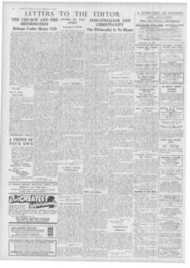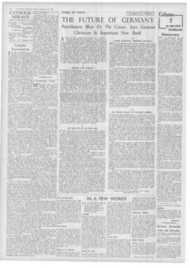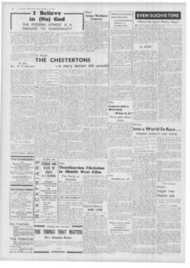Page 8, 26th September 1941
Page 8

Report an error
Noticed an error on this page?If you've noticed an error in this article please click here to report it.
Tags
Share
Related articles
Catholics Join Your Trades Unions
Strasbourg Talks On Women's Rights
What's Wrong At Halewood?
Make England Worth Defending
Being Old In The New Age
Women in Work Can't Shop, Can't Do The Washing, Never See Their Children .
—WHY NOT HALF-TIME EMPLOYMENT?
The steadily increasing employment of women in war work is creating new and difficult problems.
A Catholic Herald Social Investigator explains some of these problems and recommends part-time employ
ment as the solution.
Young married women now entering the factories on war, and other work of national importance, he writes, are beginning to realise that the care of their children is not the only problem that has to be faced when they leave their homes for the factories. Indeed, in many cases children have presented the problem least difficult of solution, for numbers of .young women, in one way or another, managed to Nettle their children, if not permanently in institutions, at least temporarily, until some permanent arrangement could be made.
There is. for instance, an oteicrit on the part of the workers that they cannot do any shopping because he shops are closed by the time they are free from work.
Further, if they leave their week's shopping until Saturday afternoon there is practically nothing left for them, or at the best only those goods which other people do not want.
THEN THERE IS WASHING
Then there is household washing. if a woman is to work in a factory all the week, it is not reasonable to expect her to spend her half-day Saturday, or her Sunday, washing. Yet washing must be done, and if it is to be sent out, then by the time a woman has paid for her fostered child, perhaps something for evacuated children, and then a bill for the laundry, the costs of which are rising rapidly, she might just as well not be working for all she'll get out of her work, particularly if, as may not be unlikely, the Income tax authorities take a portion of her
earnings as well.
On the fare of it there seems only one solution that will meet ali these difficulties, and still permit married women to enter factories. and that is part-time employment. It Ls true that under part-time women would out earn as much as under I but e-Igainst this we cart say with confidence that their expenses will be very much less, they will not he brought within inf011te tax range, and they will be able. more or less to keep their homes and families intact.
The only alternative is institutional life for all the children of married women workers, a suggestion that is contrary to most of the accepted ideas on modern social work.
NIGHT WORKERS' DIFFICULTIES Here are two examples of the troubles of women with children to be cared for.
. A few weeks ago I visited a young woman doing war work to help maintain herself and her child. Another woman with whom she lived, a day worker. and whose own children were evacuated, had arranged with this young woman --who by the Way was on night work—to look after the infant at night, leaving the mother herself to have the child by day.
Of course, the arrangement could not work for long. Two peopfe were trying Co do three jobs. and with indifferent success, but temporarily The arrangement worked.
Another woman, a widow, whom I saw recently, was also a night worker. She had four children, two girls in an institution, and
two boys—the subject of my visit. Al] through the winter blitz she had placed these two boys, nightly, to bed in the Anderson shelter in the garden, where they slept until she returned from her work the next morning.
This young woman—not pensioned—did this ratite? Man endeavour to eke out an existence on public assistance. Her earnings were £3 a week.
blog comments powered by Disqus









